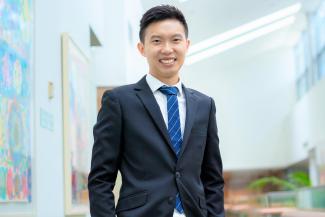
Assistant Professor Andree Hartanto from the SMU School of Social Sciences has been recognised as a Rising Star, by the Association for Psychological Science (APS).
The APS Rising Star Award is presented to outstanding APS members in the earliest stages of their research career post-PhD. Drawing its name from an Observer editorial series that featured exemplars of the exciting work being done by the field’s newest researchers, this designation recognises researchers whose innovative work has already advanced the field and signals great potential for their continued contributions.
Individuals being considered for Rising Star designation are evaluated for their promise of excellence in research based on the several criteria- significant publications; significant recognitions; significant discoveries, methodological innovations, or theoretical or empirical contributions; their work with potentially broad impact; commitment to diversity in science; and demonstrated independence from mentors.
Asst Prof Hartanto’s research aims to identify combinations of evidence-based interventions, activities, and experiences that can guide the general public towards leading a flourishing life. To achieve this, he has conducted numerous empirical studies with his students that focus on three major research streams.
The first research stream focuses on testing various experiential factors – such as linguistic experience, video gaming, music, physical activity and nutrition, smartphone use, mindfulness, nature exposure, and various cognitive trainings – that can influence the development and malleability of cognitive functions.
The second research stream focuses on identifying possible modifiable factors and interventions that can improve one’s emotional well-being and mental health. Some of the factors and interventions that have been studied include gratitude contemplation intervention, cultivating purpose in life, social media abstinence, computer use in older adults, and interaction with artificial intelligence.
The third research stream focuses on identifying psychological factors that can facilitate healthy aging in middle-aged and older adults.
To date, he has published more than 80 high-quality, peer-reviewed journal articles in these areas together with his students.
When asked about what he thought earned him the APS Rising Star Award, Asst Prof Hartanto said modestly that it was more likely the comprehensive scope and impact of the research programme at SMU that played a crucial role. His research has been instrumental in identifying various evidence-based interventions, activities, and experiences that significantly contribute to enhancing cognitive, emotional, and physical well-being.
An interesting aspect of the research has been uncovering the fact that many widely acclaimed interventions, often hyped by popular media, do not actually yield the expected benefits. He shared, “In our daily lives, we encounter a plethora of self-help tips and suggestions aimed at improving our well-being. From changing what we feel (e.g., cultivating self-compassion and gratitude, suppressing negative emotions), to how we think (e.g., changing mindset, practising mindfulness, cognitive restructuring), and even to what we do (e.g., abstaining from social media, learning new languages). While some of these suggestions are well-supported by scientific research, others lack sufficient study to examine their effectiveness.”
Asst Prof Hartanto’s research findings not only guide the public in critically evaluating these widespread suggestions but also aid in the development of good evidence-based interventions. This encapsulates the impact of the research that he is striving to achieve.
He also credits the talented graduate and undergraduate students from his Daily Experience, Affective Well-being, and Neuropsychology (DAWN) Lab. Their dedication and hard work have been instrumental in producing impactful findings.
Why did he choose to enter the field of Psychology? Asst Prof Hartanto reveals that he had always wanted to become a clinical psychologist, with the goal of using therapy to help improve the mental health and well-being of others. And so, he persuaded his parents to support his decision to study psychology.
However, after being exposed to research during his undergraduate studies, he found himself deeply passionate about it. He said, “Since then, I believe that conducting rigorous research has the potential to create an even greater impact on society. That is why, instead of pursuing a Master’s in Clinical Psychology, I chose to directly embark on a PhD in Psychology.”
Congratulations Asst Prof Hartanto, and to many more years of research excellence!